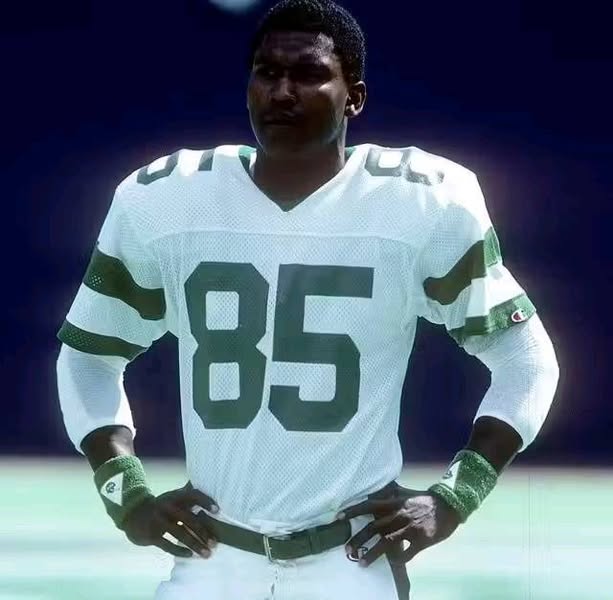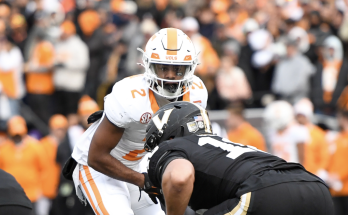In the grand tapestry of NFL history, where legacies are built on grit, glory, and unforgettable moments, few wide receivers blazed a trail quite like Wesley Walker. A name that still echoes with reverence in New York Jets lore, Walker’s career was defined by breathtaking speed, clutch performances, and an unwavering dedication to his team. From 1977 to 1989, wearing the iconic No. 85, Walker torched defenses across the league and left fans in awe of his playmaking ability. Though his name isn’t yet enshrined in the Pro Football Hall of Fame, the conversation surrounding his candidacy is far from over—and perhaps more relevant than ever.
The Early Years: Overcoming the Odds
Born on May 26, 1955, in San Bernardino, California, Wesley Walker’s road to NFL stardom wasn’t a straightforward one. Legally blind in his left eye from birth, Walker faced challenges that might have deterred even the most determined athletes. But his disability never defined him—instead, it became a testament to his resilience. At the University of California, he made a name for himself as a deep-ball specialist, dazzling scouts with his blinding speed and sure hands. The New York Jets saw his potential and selected him in the second round of the 1977 NFL Draft.
Lightning Strikes in New York
Walker wasted no time making his presence felt in the league. As a rookie in 1977, he led the NFL with an astonishing 24.4 yards per reception, finishing the year with 35 catches for 740 yards and 3 touchdowns. But it was in his second season that he truly broke out, earning his first Pro Bowl selection in 1978. That year, he tallied 48 receptions for 1,169 yards and 8 touchdowns—numbers that cemented him as one of the premier deep threats in the league.
Over the course of his 13-year career—all spent with the Jets—Walker recorded 438 receptions for 8,306 yards and 71 touchdowns. His 19.0 career average yards per reception ranks among the highest in NFL history for players with over 400 catches. He wasn’t just fast; he was precise, smart, and fearless, often making critical catches in tight coverage and at pivotal moments.
Signature Moments and Pro Bowl Brilliance
Walker’s second Pro Bowl season in 1982 was perhaps more significant than the stats suggest. In a strike-shortened season, he was a key component of the Jets’ playoff run, which saw the team reach the AFC Championship Game. In the Divisional Round against the Los Angeles Raiders, Walker hauled in a 20-yard touchdown pass that proved crucial in the Jets’ 17-14 upset win. His performances under pressure showcased not just athleticism, but also a rare mental toughness.
He was also part of one of the most memorable games in Jets history: the 1986 shootout against the Miami Dolphins. In that legendary Monday Night Football clash, Walker caught 6 passes for 194 yards and 4 touchdowns, helping the Jets to a thrilling 51-45 overtime victory. That performance remains one of the finest by any wide receiver in NFL history.
The Hall of Fame Question: Why Not Wesley Walker?
Despite his incredible production and unforgettable highlights, Walker has yet to be inducted into the Pro Football Hall of Fame. Part of the reason may lie in the era he played in—a time when passing games were less prolific and media exposure was limited. Additionally, his relatively modest reception totals compared to modern receivers may obscure his impact.
But to judge Walker solely on numbers is to miss the essence of his greatness. He was a game-changer, a player who altered defensive schemes, stretched the field like few others, and made everyone around him better. His 71 touchdowns rank him among the most prolific scorers in Jets history, and his explosiveness consistently swung games in his team’s favor.
Legacy and Life After Football
After retiring in 1989, Walker remained close to the game and to Jets fans. He has worked as a motivational speaker and a high school teacher, continuing to inspire others with his story of perseverance and achievement. Despite the visual impairment that might have held him back, Walker never used it as an excuse—and it never showed in his play.
He’s also been a passionate advocate for former players dealing with the physical and emotional toll of the game, speaking out about player safety and the need for continued support for NFL veterans.
Final Thoughts: More Than Just a Deep Threat
Wesley Walker was more than just a burner with great hands—he was a symbol of determination, talent, and grace under pressure. He may not have played in a Super Bowl, and his name might not often be mentioned alongside Jerry Rice or Lynn Swann, but ask any Jets fan who saw him play, and they’ll tell you: Walker was special.
The Hall of Fame is meant to honor those who defined excellence in professional football. Wesley Walker fits that bill—not just because of what he did on the field, but because of how he did it. His story is one of overcoming, electrifying, and ultimately, enduring. The time has come to give No. 85 the recognition he d
eserves. Canton should be calling.



